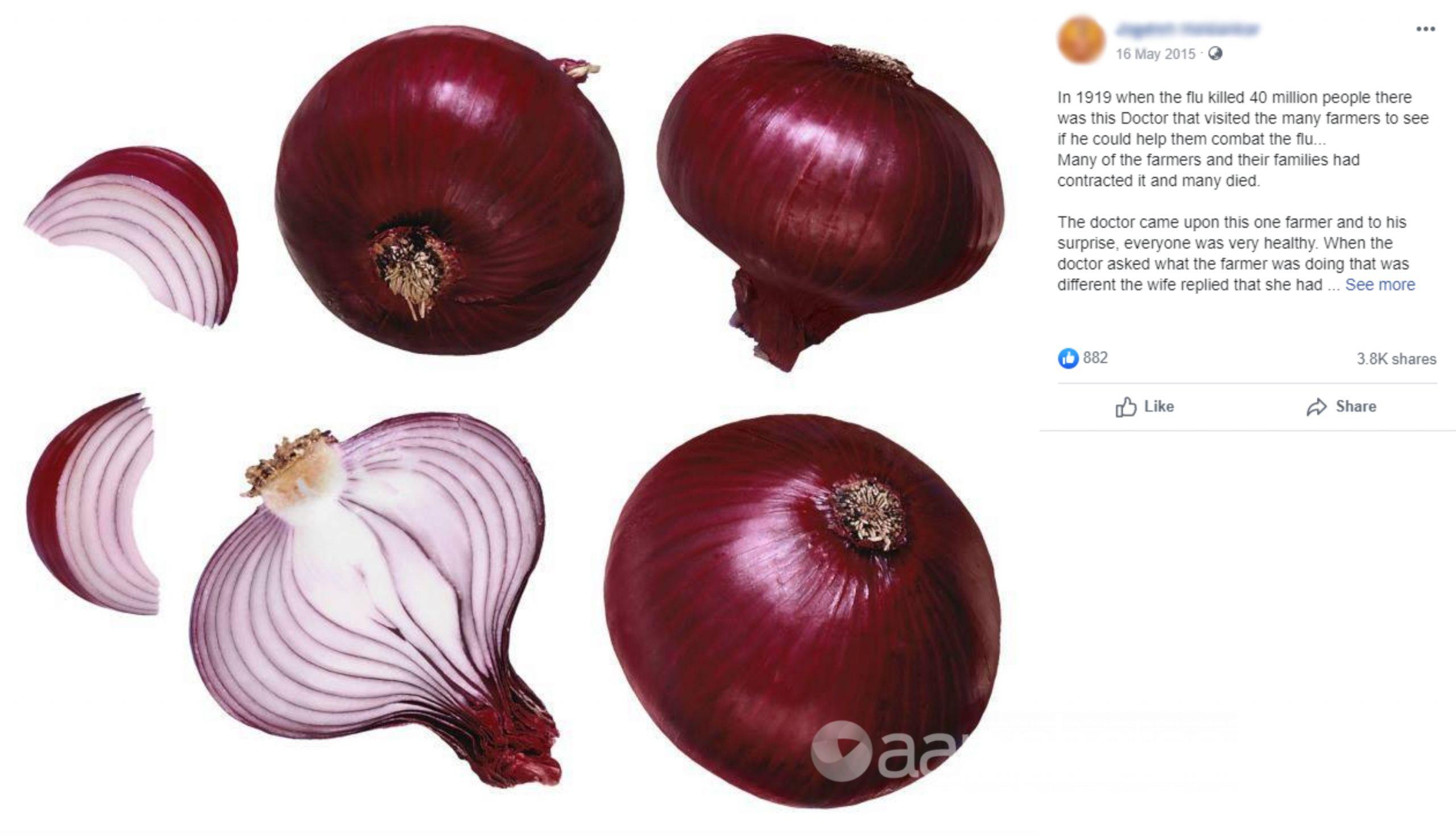The Statement
Onions might bring on tears but a Facebook post about their supposed health benefits and risks, and their dangers for dogs, seeks to bring on fears.
A May 16, 2015 Facebook post features an image of whole and cut-up red onions.
The post begins with a story about a farmer and his family who in 1919 had supposedly survived the 1918-19 Spanish Flu pandemic because his wife had “placed an unpeeled onion in a dish in the rooms of the home”.
It goes on to claims onions have disease-fighting qualities that enable them to absorb bacteria and viruses from the air if placed in a room to protect people from diseases. It also claims onions can have harmful effects, such as a cut onion becoming “highly poisonous” if left overnight and that dogs should never be fed onions because their stomachs cannot metabolise them.
The post has been shared more than 3,800 times, seen by more than 190,000 people in three months and has attracted more than 800 reactions.

The Analysis
Relating the story of the supposed flu-surviving farmer, the post tells a story that, when a doctor examined the onions left by the farmer’s wife, “he did find the flu virus in the onion”. “It obviously absorbed the bacteria, therefore, keeping the family healthy”, the post concludes.
The post interchanges the terms “virus” and “bacteria” but, as stated on the Australian government’s healthdirect.gov.au website, viruses and bacteria are two different things. While they both cause “mild to serious infections”, a bacterium is a single complex cell which can survive on its own inside or outside the body while a virus is not a cell and needs a host in order to multiply.
Dr Emma Beckett, a molecular nutritionist at the University of Newcastle, told AAP FactCheck in an email response that onions do not absorb bacteria or viruses from the air to protect humans.
“There is absolutely no evidence to back up this claim,” Dr Beckett said.
“Stop and think about how dangerous onions would be to eat if that happened.”
The post also claimed an onion would turn black if left next to someone who was sick but Dr Beckett told AAP FactCheck that an onion left anywhere long enough will turn black.
“After any plant food has been picked it eventually runs out of sources of energy and the cells start to break down, when that happens bacteria will grow and it will rot,” she said.
“But leaving it near a sick person won’t change the rate at which this happens.”
The post goes on to claim that onions have “powerful antibacterial, antiseptic properties”.
Dr Beckett said part of this claim is correct in that onions are “slightly acidic”, meaning they will “inhibit the growth of some bacteria, and the sulphur compounds in them have some antibacterial properties”.
“But these effects would be from juicing or otherwise extracting these elements and using them in medicines or as concentrates, and they still wouldn’t be as powerful as other antibiotics or cleaning products,” she told AAP FactCheck.
“You wouldn’t get a benefit through eating them or having onions sitting near you.”
Claims about onions being able to absorb viruses and bacteria from the air have been debunked in the past by fact checkers Hoax Slayer, Snopes, who traced the earliest instance of the practice back to 1900, and Canada’s McGill University.
The second part of the post, under the headline “LEFT OVER ONIONS ARE POISONOUS”, purports to tell about a tour of a mayonnaise factory where the post’s author was told by the tour guide that leftover onions could become poisonous.
The post claims “onions are a huge magnet for bacteria, especially uncooked onions” and that a sliced onion is “not even safe if you put it in a zip-lock bag” in the fridge because it is “already contaminated” by having been cut open and left out.
AAP FactCheck has previously debunked the claim that onions are a bacteria magnet and would not be safe to consume even if it was placed in an airtight container and stored in the fridge.
In that check, Simone Austin, a dietician and spokesperson for the Dietitians Association of Australia, told AAP FactCheck she had not seen any research to support such a claim and that onions contain very little protein.
“Foods that are going to develop bacteria are often due to protein in the food,” Ms Austin said.
Once chopped, Ms Austin advised onions should be stored correctly in a container so no moisture can cause mould issues.
Onions Australia, the representative body of the industry, states that if you only use part of the onion, it can be wrapped and refrigerated for up to four days.
The post ends with the claim that dogs “should never eat onions” because “their stomachs cannot metabolize onions”.
Kasra Ahmadi, a poisons specialist from the Australian Animal Poisons Centre, told AAP FactCheck in an email onions contain compounds called disulfides and thiosulphates which can be toxic to cats and dogs if ingested.
Mr Ahmadi said disulfides and thiosulfates “are metabolised by compounds that then cause oxidative damage to red blood cells resulting in anaemia”.
“The severity can range from minor gastrointestinal effects to a potentially serious, life-threatening anaemia which can result in lack of oxygen to tissues,” he said.
According to Mr Ahmadi, toxicosis is dependent on the amount ingested and the weight of the dog, with the risk and severity of toxicosis increasing with the amount ingested.
“Poisoning has occurred from the ingestion of whole raw onions but also from chopped, cooked and dehydrated onions as well as products containing onion powder,” he said.
Dr Anne Fawcett, a veterinarian and lecturer at the University of Sydney, told AAP FactCheck in an email onions contain toxic components that can damage red blood cells, leading to anaemia in a range of species including dogs and cats.
“As onions … are potentially toxic to dogs (and cats), it is good practice to avoid feeding onions … to companion animals altogether,” she said.
In response to the claim that dogs’ stomach cannot metabolise onions, Dr Fawcett said: “the canine stomach can metabolise onions, that isn’t the issue. The issue is one of toxicity.”
The Verdict
Based on the evidence, AAP FactCheck found the Facebook post to contain a mixture of accurate and inaccurate information. Onions cannot absorb bacteria or viruses from the air and do not turn black from absorbing “germs”, according to nutritionist Dr Emma Beckett. Onions do have antibacterial properties through being slightly acidic but those properties are present only if onion extracts are concentrated.
The claim that onions are a “huge magnet for bacteria” is also false. Dietitian Simone Austin said foods prone to developing bacteria are often high in protein and onions have very little.
It is correct that feeding onions to dogs should be avoided, with veterinarian Dr Anne Fawcett advising against feeding onions to companion animals, including dogs. Dr Fawcett said dogs’ stomachs can metabolise onions but toxic compounds can affect the animals.
Partly False – The claims of the content are a mixture of accurate and inaccurate or the primary claim is misleading or incomplete.
* AAP FactCheck is an accredited member of the International Fact-Checking Network. To keep up with our latest fact checks, follow us on Facebook, Twitter and Instagram.
All information, text and images included on the AAP Websites is for personal use only and may not be re-written, copied, re-sold or re-distributed, framed, linked, shared onto social media or otherwise used whether for compensation of any kind or not, unless you have the prior written permission of AAP. For more information, please refer to our standard terms and conditions.


















